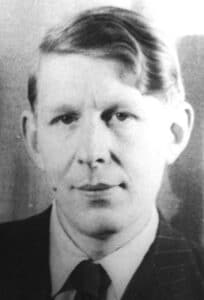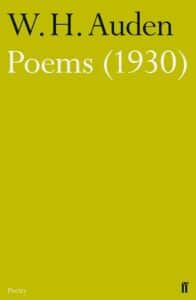The first poetry collection by W.H. Auden took the literary world by storm
Wystan Hugh (W.H.) Auden (1907-1973) is considered one of the finest poets of the mid-20th century, if not the finest. He had a large influence on poetry, including American poetry. Born in Britain, he emigrated to the United States in his 30s and became a U.S. citizen, and he eventually managed to win both a Pulitzer Prize for Poetry (The Age of Anxiety: A Baroque Eclogue) and a National Book Award for Poetry (The Shield of Achilles).
Auden exercised considerable influence in literary circles. He was first a poet, yes, but he was also a critic, a lecturer, a playwright, and an opera librettist. Many have pointed out that no one since Auden has had such a literary influence on writing in English, an influence that was global. His style and his intellect had a significant influence on such poets as Robert Lowell, John Ashbery, James Merrill, the New Formalists, Maxine Kumin, and many others. His influence could also work the opposite way — it was so pervasive that the Beat Generation poets were said to be writing like they did in reaction to Auden.
The words that come immediately to mind in characterizing his poetry are elegant, learned, modern, polished, incisive, and classical. Yet his poetry could also be funny, gossipy, hectoring, and conversational. Auden was an intellectual force and presence at a time when such a force and presence were possible and often welcomed.

W.H. Auden
He knew fame from the beginning. When Auden was 21, the poet Stephen Spender privately printed a collection of his poems. Auden was 23 when his first “official” poetry collection, simply entitled Poems (1930), was published. He republished it in 1933, replacing seven poems in the original with new ones. It probably didn’t hurt that Auden’s editor and the person who brought him to literary recognition was T.S. Eliot at the British publishing firm Faber & Faber.
Poems (1930) includes a verse play and 30 poems titled with Roman numerals. Verse plays historically have likely been the most common form of theater, going back to the Greeks and Romans, reaching a climax with the Elizabethans like William Shakespeare and continuing well into the 18th and 19th centuries. The most famous verse play of the 20th century is Eliot’s Murder in the Cathedral (1935). While not as popular as they once were, verse plays continue to be written and performed today.
Auden included the verse play Paid on Both Sides: A Charade. It’s not the easiest play script to read. Set in Scotland, it’s a kind of Romeo and Juliet story, with warring families trying to do each other in. But it also fuses elements from Norse sagas, old English poems, modern psychologists, and even Father Christmas. What it speaks to is the surprising literary depth of a young writer in his early 20s.
Auden demonstrates a similar depth in these 30 poems. A few are traditional, rhyming poems, almost classical in their structure and language. Others are free verse. And some, like this one, have elements of both and become something entirely different from those forms.
Poem XVII

Has no history
Is complete and early,
If beauty later
Bear any feature
It had a lover
And is another.
This like a dream
Keeps other time
And daytime is
The loss of this,
For time is inches
And the heart’s changes
Where ghost has haunted
Lost and wanted.
But this was never
A ghost’s endeavor
Nor finished this,
Was ghost at ease,
And till it pass
Love shall not near
The sweetness here
Nor sorrow take
His endless look.
It’s a beautiful poem, the flow of the language becoming even more so when the poem is read aloud. Some critics have noted Auden’s influence of writers like Thomas Hardy, Emily Dickinson, Eliot, and Wilfred Owen, and this poem has a sense of both Eliot and Dickinson.
Poems (1930) turned the young Auden into something of an immediate sensation. It’s easy to see why, even almost a century later. Beginning with the verse play, the poems are as much about what’s not there as what is. Even when not overtly mentioned, social and psychological concerns course through the 30 poems. Like many of the poets and writers of the 1920s and 1930s, Auden was comfortable with Marxist and socialist ideas; some 25 years would pass before he finally and permanently left them behind.
The language alone makes Poems (1930) a brilliant collection. How Auden arranges words and lines to create a flow and rhythm of language is often astonishing. The work portended great and greater things to come, and Auden would not disappoint.
Next week: The Shield of Achilles by W.H. Auden, the new edition edited by Alan Jacobs.
Related:
September 1, 1939: The Biography of a Poem by Ian Sansom
Photo by Susana Fernandez, Creative Commons, via Flickr. Post by Glynn Young.
How to Read a Poem uses images like the mouse, the hive, the switch (from the Billy Collins poem)—to guide readers into new ways of understanding poems. Anthology included.
“I require all our incoming poetry students—in the MFA I direct—to buy and read this book.”
—Jeanetta Calhoun Mish
- Poets and Poems: Donna Vorreyer and “Unrivered” - October 7, 2025
- Poet Sidney Lanier and the Lost Cause - October 2, 2025
- Poets and Poems: A.J. Thibault and “We Lack a Word” - September 30, 2025


Leave a Reply